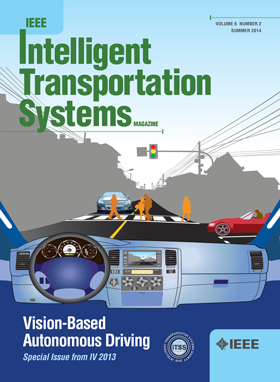Reliability-Based Equilibrium Model Considering Promotive Impacts of Connected and Autonomous Vehicles on Traffic Flow Stability in a Mixed Traffic Network
IF 7.9
1区 工程技术
Q1 ENGINEERING, CIVIL
IEEE Transactions on Intelligent Transportation Systems
Pub Date : 2025-02-24
DOI:10.1109/TITS.2025.3541680
引用次数: 0
Abstract
Existing studies on traffic flow stability primarily focused on local stability, with little attention given to its extension to the network level, known as network stability. In this paper, a reliability-based equilibrium model in a mixed traffic network including human-driven vehicles and connected and autonomous vehicles is developed to analyze the impact of connected and autonomous vehicles on traffic flow stability. The basic characteristics of the model are first examined on a small network, demonstrating the non-uniqueness of the link flow in the user equilibrium pattern. Then, the model is extended to the case of a general network with Variational Inequality (VI) equations. In addition, a two-level optimization strategy is developed by incorporating the pricing and quantity control strategies to the reliability model. Numerical examples are conducted based on Sioux Falls networks to examine the performance of the proposed models.考虑联网车辆和自动驾驶车辆对混合交通网络交通流稳定性促进作用的基于可靠性的均衡模型
现有的交通流稳定性研究主要集中在局部稳定性上,很少关注其在网络层面的扩展,即网络稳定性。本文建立了一个基于可靠性的混合交通网络均衡模型,其中包括人类驾驶车辆以及联网和自动驾驶车辆,以分析联网和自动驾驶车辆对交通流稳定性的影响。首先在一个小型网络中检验了模型的基本特征,证明了用户平衡模式中链路流的非唯一性。然后,将模型扩展到具有变量不等式(VI)方程的一般网络。此外,通过将定价和数量控制策略纳入可靠性模型,还开发了一种两级优化策略。以苏福尔斯网络为基础进行了数值示例,以检验所提出模型的性能。
本文章由计算机程序翻译,如有差异,请以英文原文为准。
求助全文
约1分钟内获得全文
求助全文
来源期刊

IEEE Transactions on Intelligent Transportation Systems
工程技术-工程:电子与电气
CiteScore
14.80
自引率
12.90%
发文量
1872
审稿时长
7.5 months
期刊介绍:
The theoretical, experimental and operational aspects of electrical and electronics engineering and information technologies as applied to Intelligent Transportation Systems (ITS). Intelligent Transportation Systems are defined as those systems utilizing synergistic technologies and systems engineering concepts to develop and improve transportation systems of all kinds. The scope of this interdisciplinary activity includes the promotion, consolidation and coordination of ITS technical activities among IEEE entities, and providing a focus for cooperative activities, both internally and externally.
 求助内容:
求助内容: 应助结果提醒方式:
应助结果提醒方式:


